Superstitions have always fascinated people, and one of the most intriguing beliefs is that toads bring good luck. For centuries, cultures around the world have embraced toads as symbols of fortune and positive energy. But is there any truth to this belief? Do toads really have the power to influence our fate?
In this article, we aim to delve into the mystery of toads and their connection to luck. We’ll explore the cultural significance of these amphibians as symbols of good fortune and examine the beliefs and folklore that have shaped this belief. From ancient traditions to modern-day perspectives, we’ll analyze the role of toads in the world of superstitions and uncover the truth behind this fascinating phenomenon.
Key Takeaways
- Many cultures believe that toads bring good luck.
- Toads are often used as lucky charms or incorporated into rituals and traditions associated with fortune and good luck.
- Skepticism exists about whether toads truly have any influence on our fortunes.
- Toads may hold personal significance as symbols of good luck for individuals.
- Exploring superstitions can provide insight into cultural beliefs and practices throughout history.
Belief in Lucky Toads
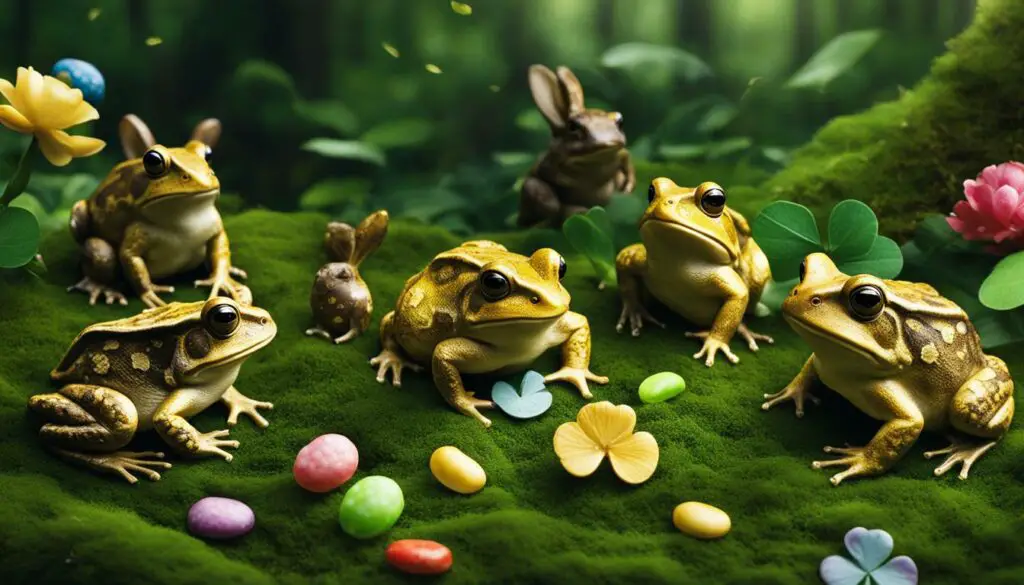
For centuries, people have believed in the luck associated with toads. Superstitions about toads and luck are prevalent in many cultures worldwide.
The reasons behind this belief are varied. Some people think that toads bring good fortune because they are associated with certain gods or goddesses that are known to bring luck. Others believe that toads are lucky because of their physical appearance and behavior. For example, the toad’s ability to survive and thrive in different environments is seen as a symbol of good fortune.
One common superstition about toads and luck is that carrying a toad in your pocket or wearing a toad charm can bring you wealth and prosperity. This belief is particularly prevalent in Chinese culture, where toads are often depicted with coins in their mouths, symbolizing wealth and abundance.
| Interesting Fact: | In some cultures, it is believed that the toad’s warts are a sign of their luck-bringing abilities. |
|---|
Despite the lack of scientific evidence to support these beliefs, many people still hold fast to them. To some, the idea that a small creature like a toad can influence their luck is comforting and gives them a sense of control over their lives.
Belief in Lucky Toads Example
“My grandmother used to keep a toad in her garden because she believed it would bring good luck. She said that as long as the toad was around, her plants would thrive and she would always have good health and fortune. I don’t know if I believe in it myself, but it’s a nice thought.”
Superstitions about toads and luck may seem strange to some, but they are an integral part of many cultures and traditions. The belief in lucky toads is a testament to the enduring power of folklore and the human desire to find meaning and purpose in the world around us.
Toads in Luck Traditions
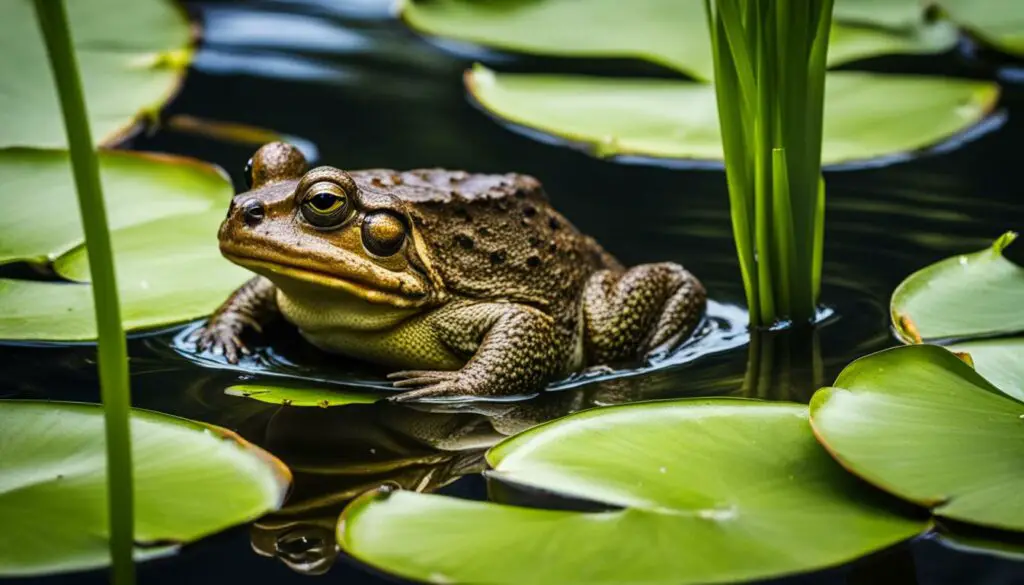
Luck has been an integral part of human history, and toads have played a significant role in various cultures’ luck traditions. The folklore surrounding lucky toads is fascinating, and the rituals associated with them are intriguing. Let’s explore some of the ways in which toads are present in luck traditions.
The Ancient Egyptians
The Ancient Egyptians revered toads as symbols of transformation and good luck. They believed that toads emerged from the Nile River with the annual floods, which brought new life and prosperity. The Egyptians linked the toad with their goddess Heket, who was the goddess of childbirth and fertility. The toad represented the goddess’s life-giving powers and was seen as a protector of newborns.
Asian Cultures
Toads have a long history of being used for medicinal purposes in Asian cultures. They were used in traditional Chinese medicine to treat a variety of ailments, such as sore throats, epilepsy, and skin disorders. In Japan, the toad is a symbol of good luck and is often depicted holding a coin in its mouth, representing wealth and prosperity.
European Folklore
In European folklore, toads have been associated with witches and magic. It was believed that witches would use toads to create potions and spells. However, toads were also seen as protectors against witchcraft and evil spirits. In some parts of Europe, it was believed that if a toad was kept in the house, it would bring good luck and prosperity to the family.
African Beliefs
In many African cultures, the toad is a symbol of fertility and good luck. It is believed that if a toad enters your home, it is a sign of good fortune. In some parts of Africa, toads are kept as pets and are considered to be good luck charms.
The presence of toads in luck traditions across various cultures is intriguing. Whether they are associated with transformation, fertility, or protection, toads have been integral to human beliefs and practices for centuries.
Toads as Lucky Charms
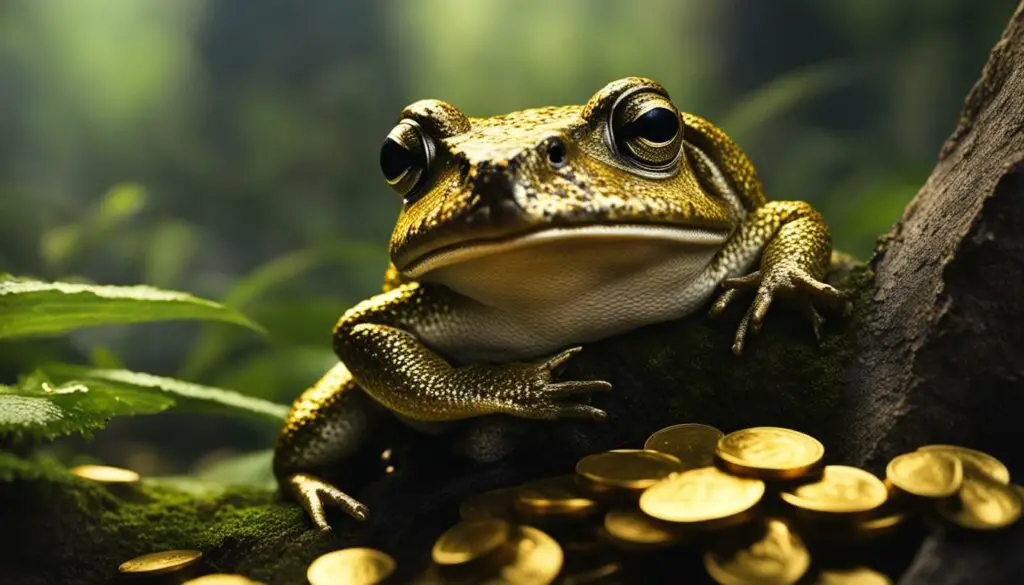
Toads have been used as lucky charms for centuries. From ancient times to modern-day, these amphibians have been incorporated into various objects believed to bring good luck to their owners.
In different cultures, toads have been used in different ways as lucky charms. For example, in Chinese culture, toads with three legs, known as Chan Chu, are associated with wealth and prosperity. Similarly, in Native American cultures, toads are considered symbols of transformation and change, and carrying or wearing a toad amulet is believed to bring good luck and positive energy.
Toads have also been used in jewelry, such as necklaces, bracelets, and earrings. Many of these pieces feature a toad with a coin in its mouth, symbolizing wealth and prosperity.
Other popular forms of toad lucky charms include small statues, carvings, and trinkets. These items often feature a toad in a specific pose or holding an object associated with good luck, such as a coin or a bag of money.
| Symbolism | Culture |
|---|---|
| Transformations and change | Native American |
| Wealth and prosperity | Chinese |
| Good luck and positive energy | Vietnamese |
Regardless of the form they take, toad lucky charms serve as powerful symbols of good fortune and positive energy. Whether you carry one in your pocket or wear one as jewelry, these charms are thought to help attract wealth, success, and prosperity into your life.
Lucky Toads in Different Cultures
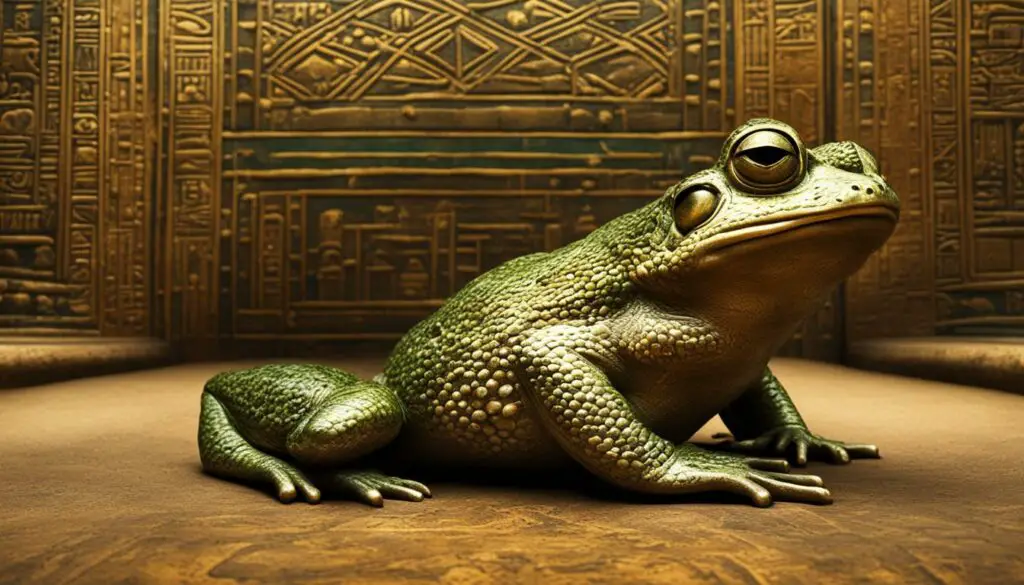
Toads have been valued as symbols of good luck in many cultures throughout history. These amphibians have been revered for their supposed magical powers and believed to bring good fortune to those who encounter them. Let’s explore the cultural significance of lucky toads in different parts of the world.
Ancient Egypt
In ancient Egypt, the toad was a sacred animal associated with the goddess Heket, who was believed to be the creator of life. Toads were considered symbols of fertility and were often featured in Egyptian art and jewelry. They were also believed to have healing properties and were used for medicinal purposes.
China
In China, the three-legged toad is a popular symbol of good fortune and prosperity. It is believed that by placing a statue of a three-legged toad in your home, you will attract wealth and abundance. The toad is also closely associated with the lunar goddess Chang’e and is said to possess lunar energy.
Japan
In Japan, the toad is seen as a symbol of good luck, particularly in matters of love and money. The Japanese believe that the toad brings good fortune because it is a skilled hunter and always lands on its feet. They also associate the toad with the god Okuninushi, who is believed to bring prosperity and happiness.
Mexico
In Mexico, the toad is considered a powerful symbol of transformation and renewal. The Aztecs believed that the toad had the ability to transform itself into different animals, including humans. They also believed that the toad was a messenger between the living and the dead, and that it could guide people through the afterlife.
From ancient civilizations to modern-day cultures, the toad has played a significant role in the beliefs and superstitions surrounding luck. Whether they are seen as symbols of fertility, prosperity, or transformation, lucky toads continue to fascinate and intrigue people around the world.
Exploring the Mystery of Toads and Luck
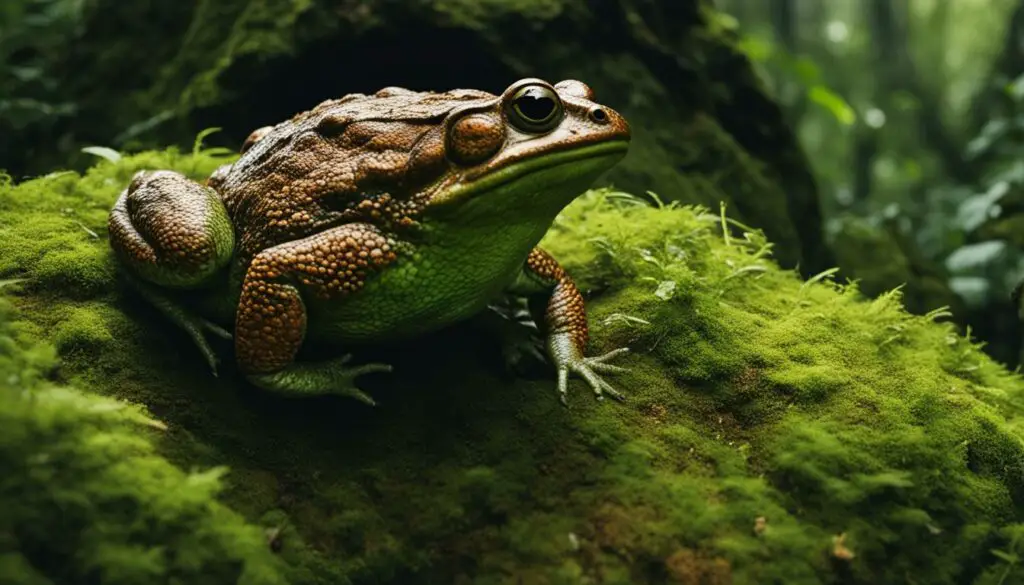
While it may seem strange to some that a slimy amphibian could bring good luck, the belief in lucky toads has been a part of human history for centuries. For those who believe in their power, toads are seen as a symbol of prosperity, abundance, and good fortune.
The mystery behind toads and luck is not easily explained. Some believe it has to do with the toad’s association with water, which has long been considered a source of life and abundance. Others point to the toad’s unique appearance and behavior, which is often seen as a sign of good luck in various cultures.
There are also scientific explanations that attempt to explain the link between toads and luck. Some researchers suggest that the toxins found in the skin of some toads may have medicinal properties that can bring good health and longevity to those who consume them.
Regardless of the origins of the belief in lucky toads, their significance in various cultures cannot be ignored. From ancient Egyptian hieroglyphs to modern-day Chinese zodiacs, toads have played a central role in the symbolism of good luck.
But as with any superstition, there are those who remain skeptical. Some argue that the belief in lucky toads is nothing more than a cultural tradition, with no scientific or logical basis. Others suggest that the power of luck lies within the individual, rather than external objects or creatures like toads.
The Importance of Culture in Understanding Toads and Luck
Despite the skeptics, it’s clear that the belief in lucky toads is deeply rooted in cultural traditions and folklore. In many societies, toads are viewed as a powerful symbol of good fortune, representing wealth, fertility, and abundance.
For example, in ancient Rome, the toad was associated with the goddess Venus, who was seen as the embodiment of love, beauty, and prosperity. The toad was also believed to have the power to restore youth and vitality to those who possessed it.
In Japan, the toad is known as the “jin chan,” or “money toad,” and is believed to bring wealth and prosperity to those who possess it. It is often depicted as a three-legged toad, holding a coin in its mouth.
The symbolism of the toad in different cultures is a testament to the power of cultural beliefs and traditions. While some may dismiss the belief in lucky toads as superstitious nonsense, it’s important to recognize the role that culture plays in shaping our beliefs and attitudes toward the world around us.
The Mystery Endures
Despite centuries of belief in the luck associated with toads, the mystery of their supposed power remains unsolved. Whether it’s due to cultural traditions, scientific explanations, or individual beliefs, the connection between toads and luck continues to intrigue and fascinate us.
So the next time you spot a toad in your garden or on a hike, take a moment to consider its significance. You never know, it might just be a bringer of good luck.
Debunking Myths and Misconceptions

Despite the widespread belief in the luck associated with toads, there are various myths and misconceptions surrounding these creatures that need to be addressed. One of the most common misconceptions is that all toads are poisonous, but this is false. While some species of toads produce toxins, not all of them are harmful to humans.
Another myth is that toads can give people warts. This is also untrue, as warts are caused by human papillomavirus (HPV) and are not transmitted from toads or any other amphibians.
| Myth/Misconception | Truth |
|---|---|
| All toads are poisonous | False – Some species of toads produce toxins, but not all of them are harmful to humans |
| Toads can give people warts | False – Warts are caused by human papillomavirus and are not transmitted from toads or any other amphibians |
| Toads are slimy | False – While toads may appear slimy, they actually have dry skin with warts and bumps |
It’s also a common mistaken belief that toads can shoot poison or venom from their eyes. This is purely a myth, and there is no scientific evidence to support this claim. Toads aren’t aggressive animals and would much rather hop away than confront a potential predator or threat.
“Despite their bad reputation, toads are fascinating creatures that deserve our respect and protection. While it’s important to differentiate between fact and fiction, we should strive to learn more about these creatures and appreciate their ecological significance.”
Toads in Modern Culture
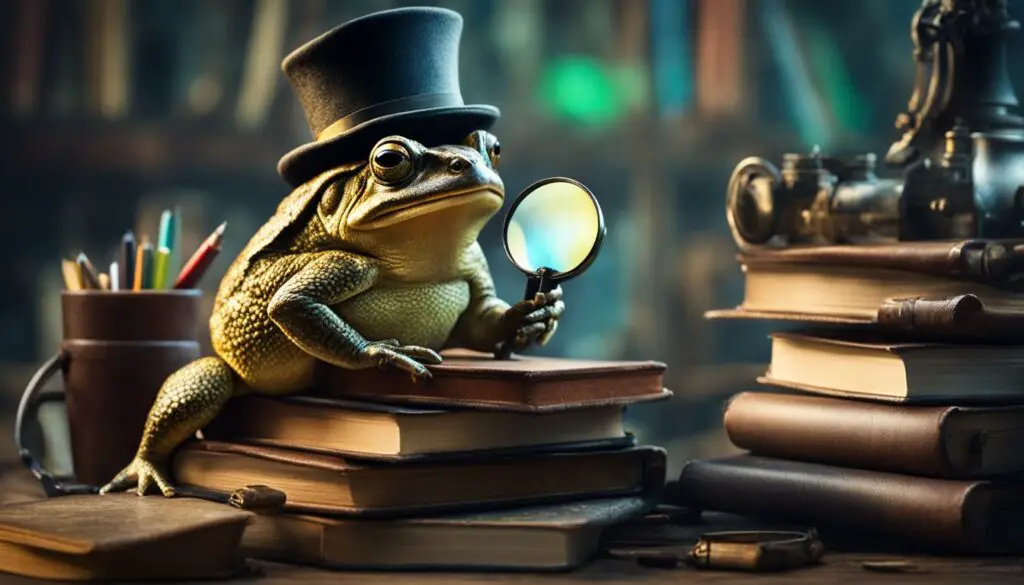
From literature and art to popular media, toads continue to make appearances in modern culture, often as symbols of good luck. One iconic example is the character of Mr. Toad from the classic children’s book “The Wind in the Willows.” Mr. Toad is portrayed as a charismatic and adventurous character, always in search of new and exciting experiences. Additionally, the popular Japanese video game character, Toad, from the Super Mario franchise, takes on a friendly and loyal persona, often providing assistance to the game’s protagonist, Mario.
Outside of fictional media, toads have also made their way into modern fashion and design. Toad-themed jewelry, trinkets, and clothing items can be found in many stores.
The image above showcases a popular toad-themed t-shirt design, often worn by those who believe in the luck associated with these amphibians.
Overall, toads continue to be integrated into modern culture in various ways, illustrating their enduring significance as symbols of good fortune.
The Role of Luck in Everyday Life
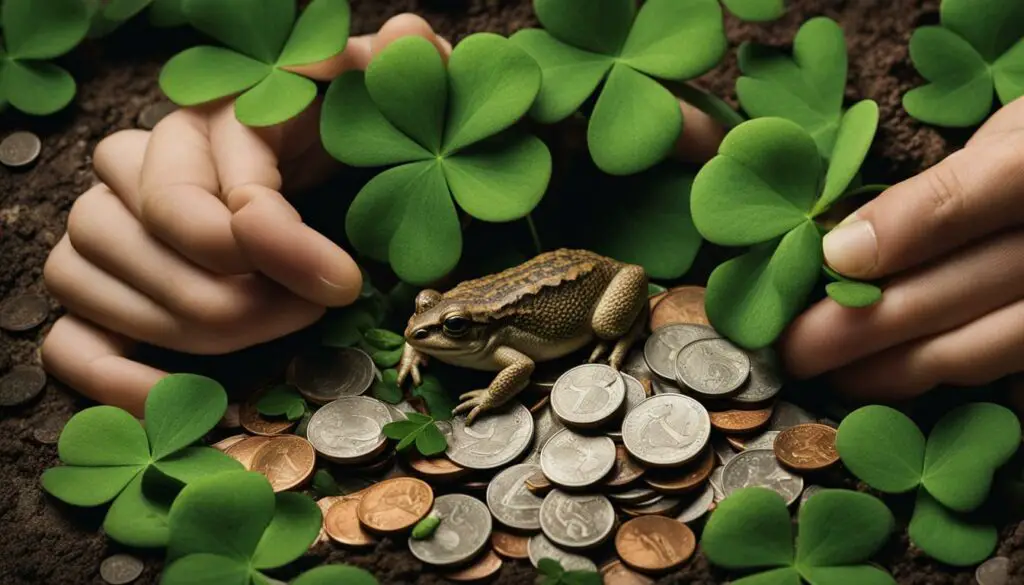
Luck plays a significant role in many aspects of our lives. Whether it’s getting the perfect job or finding a romantic partner, luck can often feel like a crucial factor in determining our success. But what exactly is luck, and how much control do we have over it?
Some people believe that luck is entirely random, and that there is nothing we can do to influence it. Others argue that we can create our own luck through hard work, positive thinking, and other strategies.
Regardless of where you fall on the spectrum, it’s clear that luck is a complex and multifaceted concept. In some cases, luck may be little more than chance or coincidence. In other situations, however, luck may be influenced by factors such as timing, preparation, and the ability to recognize and seize opportunities.
So what does this mean for toads and their supposed connection to good luck? While the scientific evidence may be inconclusive, it’s clear that many people around the world continue to place great stock in the power of these creatures to bring good fortune. Whether or not you believe in the luck of toads, there’s no denying that the concept of luck itself remains a fascinating and deeply ingrained aspect of our lives.
Strategies for Cultivating Luck
If you’re looking to increase your luck in life, there are several strategies you can try:
- Visualize success and positive outcomes
- Be open to new opportunities and experiences
- Take calculated risks
- Stay optimistic and positive
- Be persistent and resilient in the face of failure
- Acknowledge and learn from your mistakes
By incorporating these habits into your daily life, you may be able to create your own luck in a variety of different areas.
“I’m a great believer in luck, and I find the harder I work, the more I have of it.” – Thomas Jefferson
Skepticism and Alternative Perspectives
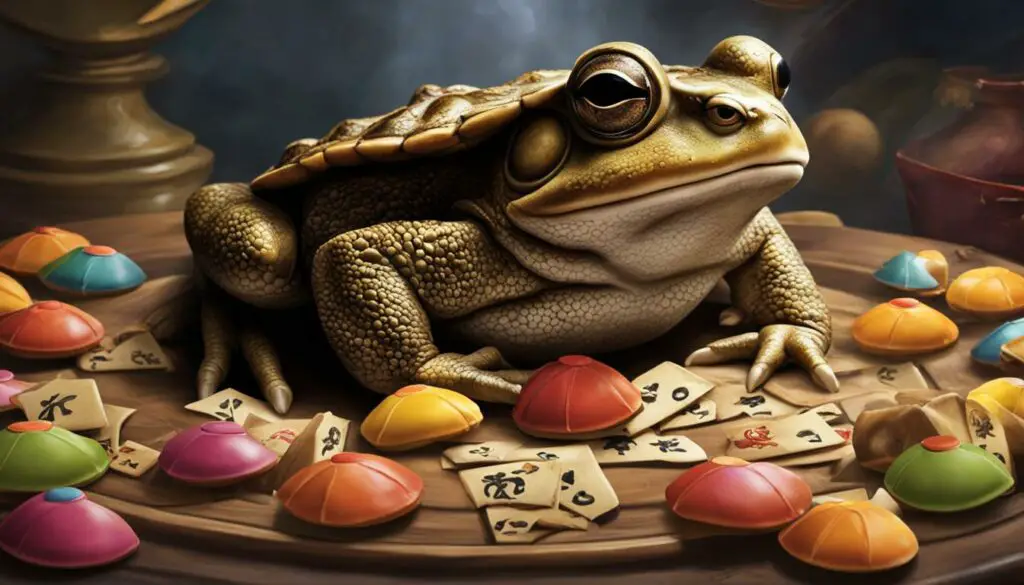
While many cultures believe in the luck associated with toads, there are also those who remain skeptical about the idea. Some argue that the belief in lucky toads is simply a superstition, with no scientific basis for the supposed connection between toads and good fortune.
Alternative perspectives suggest that luck is a purely subjective concept, with no tangible basis in reality. Skeptics argue that factors such as hard work, determination and opportunity are more likely to contribute to success than superstitions about toads and their supposed luck-bringing abilities.
A Closer Look at the Science
Scientifically, there is no evidence to support the idea that toads have any influence on our fortunes. While some may argue that toads bring good luck because they eat pests like mosquitoes, others point out that this doesn’t necessarily translate into improved luck for the individual.
Some experts also suggest that the belief in lucky toads may stem from a psychological phenomenon called confirmation bias. This is when individuals look for evidence to support their beliefs, while ignoring anything that contradicts them. So, if someone believes that toads bring good luck, they may be more likely to perceive good luck when they encounter toads – even if it’s just a coincidence.
“It is easy to believe in something when you want it to be true…the challenge is to base your beliefs on reality, even when it’s painful.”
Challenging Beliefs
It’s important to recognize that beliefs about lucky toads are not universal. While some cultures embrace toads as symbols of good luck, others view them as bad omens or signs of impending danger. It’s also important to respect the beliefs of others, even if we may not share them ourselves.
However, challenging our beliefs and being open to alternative perspectives can help us to critically evaluate the world around us. Instead of blindly accepting superstitions about toads or luck, we can seek to understand the evidence behind these claims and make informed decisions based on reality.
So, while the question of whether toads are actually good luck remains unanswered, exploring skepticism and alternative perspectives can help us to approach the topic with a more critical and thoughtful mindset.
Toads: A Personal Symbol of Luck
While toads are often associated with cultural beliefs surrounding good luck, they can also hold personal significance for individuals as symbols of fortune and prosperity.
For some, a chance encounter with a toad or a series of events that seem to defy coincidence can lead to the creature becoming a personal talisman for luck. Others may be drawn to the unique appearance and behavior of toads, finding them to be fascinating creatures that inspire feelings of positivity and good energy.
Whatever the reason, the personal symbolism of toads as lucky charms can be a powerful force in people’s lives. Some individuals may carry a toad-shaped trinket in their pocket or wear a toad-themed piece of jewelry as a reminder of their faith in the creature’s ability to bring good fortune.
Ultimately, whether toads truly possess the power of good luck or whether their perceived influence is merely a product of superstition and folklore is a question that remains open to interpretation. However, for those who have found personal meaning and significance in the toad as a symbol of good fortune, its importance cannot be denied.
“I’ve always felt a connection to toads,” says Samantha, a 28-year-old graphic designer. “Whenever I see one, it just feels like a good omen. I even have a small brass toad that I carry in my purse for extra luck.”
As with any personal belief or superstition, the power of toads as symbols of good luck ultimately lies in the individual’s perception and faith. Whether you choose to embrace the toad as a lucky talisman or approach the creature with skepticism, the mysterious and fascinating world of toads and their connection to good fortune is one that continues to intrigue and captivate.
Conclusion
After a thorough exploration into the fascinating world of superstitions and luck, we can conclude that toads have been historically considered symbols of good luck in many cultures around the world. Although there is no scientific evidence to support the idea that toads can influence our fortunes, their cultural significance persists.
Throughout time, toads have played a significant role in rituals and traditions, and have been incorporated into various lucky charms and jewelry. Their appearance in literature and popular media continues to contribute to their reputation as lucky symbols.
While some people remain skeptical about the idea of toads as lucky charms, others hold personal beliefs and experiences that have cemented their status as symbols of good luck. Ultimately, the power of luck and superstitions is a deeply personal and subjective matter.
Final Thoughts
In conclusion, are toads good luck? The answer may vary depending on personal beliefs and cultural traditions. Regardless of one’s perspective, exploring the mystery and history behind toads and luck is a fascinating journey that sheds light on the power of human beliefs and cultural rituals. Whether toads truly possess luck-bringing qualities or not, they remain a captivating and intriguing creature that has captured the imagination of people around the world.
FAQ
Are toads really a symbol of good luck?
Yes, many cultures around the world believe that toads bring good luck and positive energy.
Why are toads considered lucky?
Toads have long been associated with good fortune due to their appearance in folklore and cultural traditions.
How are toads used in luck traditions?
Toads are incorporated into various luck traditions, including charms, talismans, and rituals.
Can toads be used as lucky charms?
Absolutely! Toads have been used as lucky charms for centuries and are often incorporated into jewelry and trinkets.
Do different cultures have different beliefs about lucky toads?
Yes, lucky toads hold different cultural significance in various societies around the world.
How can we explain the connection between toads and luck?
We explore scientific, historical, and cultural perspectives to shed light on this intriguing phenomenon.
What are some common myths and misconceptions about toads and luck?
We address common misconceptions surrounding toads and provide factual information to debunk these myths.
Do toads have any influence on our modern lives?
We discuss the broader concept of luck and examine the role it plays in our everyday lives.
Are there alternative perspectives on the belief in lucky toads?
While many believe in the luck associated with toads, there are skeptics who challenge this notion.
Can toads hold personal significance as symbols of luck?
Absolutely! Toads can become personal symbols of good luck for individuals based on their own experiences and beliefs.

